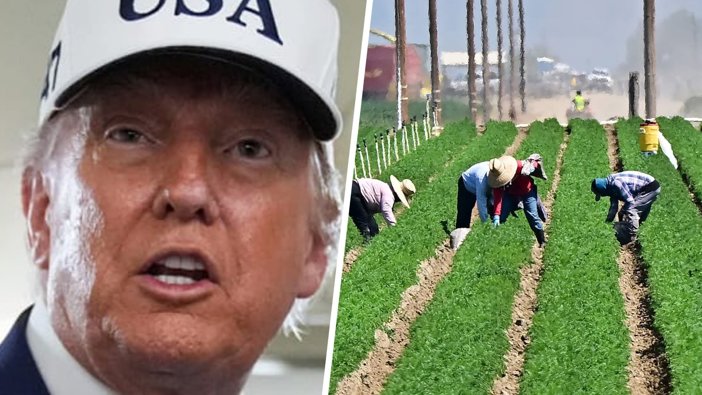
Trump’s Farmworker Proposal Draws GOP Criticism
Trump’s ICE carveout for farm and hotel workers sparks Republican divisions, with debate over enforcement priorities.
GOP Rift Over Temporary Status Plan for Key Workers
President Donald Trump’s proposal to offer a "temporary pass" for certain farm and hospitality workers is generating debate among Republicans, as Immigration and Customs Enforcement (ICE) operations continue nationwide. The plan, aimed at providing a legal path for longtime workers in key industries, has drawn both support and criticism from within the party.
During a tour of the "Alligator Alcatraz" detention center in Florida alongside Governor Ron DeSantis and Homeland Security Secretary Kristi Noem, Trump detailed his approach to immigration enforcement. He described situations where farmworkers who have spent more than a decade on the job, with strong backing from their employers, would be eligible for legal status without fear of deportation. “The farmers know them. It’s called farmer responsibility, or owner responsibility, where they’re gonna be largely responsible for these people,” Trump explained, adding that these workers would not receive citizenship but could pay taxes and continue their employment legally.
The president emphasized the need for such a system, noting, “The farmers need them to do the work.” He reiterated that while the administration will prioritize removing dangerous criminals, some flexibility is needed for vital sectors. “We're going to have a system of signing them up so they don't have to go. They can be here legally, they can pay taxes, and everything,” he said.
Republican Concerns Over Selective Enforcement
Not all Republicans are convinced. Jessica M. Vaughan, policy director at the Center for Immigration Studies, warned against selective enforcement. “This is a bad idea. The law should not be enforced selectively, with politically-connected employers getting away with hiring illegal workers,” she argued, pointing to existing visa programs for farm and hotel employers. Vaughan contended, “They shouldn't get a pass now for their unscrupulous behavior before. Hotel employers can get seasonal workers, and many of them do.”
In California, six Republican lawmakers sent a letter urging the administration to focus ICE and Department of Homeland Security enforcement on immigrants with criminal records and avoid broad raids that cause workplace disruption, as reported by KCRA. State Senator Melissa Melendez publicly opposed this stance, writing on X, “So, if I’m to understand this correctly, we should look the other way regarding illegal immigration as long as it’s in the construction, hotel, or restaurant industries? This is far beyond disappointing, it’s infuriating.”
The White House responded by highlighting the administration’s prioritization of public safety. Press secretary Karoline Leavitt told reporters, “The President’s focus and the focus of this Administration is, of course, to remove public safety threats from the streets and to deport as many of the illegal criminals, especially the violent criminals, that we know are still here because of the previous administration.” White House spokeswoman Abigail Jackson reiterated Trump’s commitment to “the largest mass deportation operation in history” with a continued focus on criminal aliens and sanctuary cities.
On Truth Social, Trump assured followers that “Changes are coming!” for agricultural and hospitality enforcement. Border czar Tom Homan confirmed that worksite enforcement remains ongoing, “even on farms and hotels but based on a prioritized basis,” while emphasizing that “Criminals come first.”
Trump further clarified his stance in a recent interview, saying, “I'm the strongest immigration guy that there’s ever been, but I’m also the strongest farmer guy that there’s ever been.”
As debate intensifies within the Republican Party, the final shape of immigration enforcement for critical industries remains uncertain. How lawmakers and the administration resolve these differences will have lasting impacts on both U.S. agriculture and the broader national immigration strategy.






